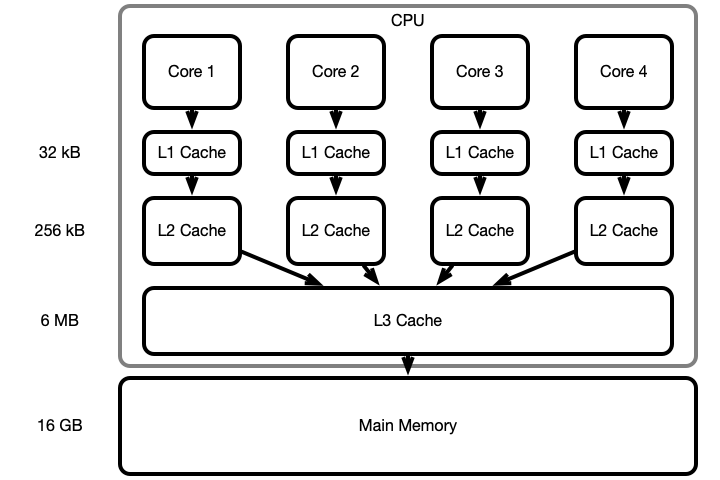Lecture 24: Progress and Locks
COSC 273: Parallel and Distributed Computing
Spring 2023
Announcements
- Homework 03 Draft Posted
- due Friday, April 14th
- Short quiz on Friday, April 7th
- Given two implementations, which is faster?
- Reason about parallelism/locality of reference
Today
- Progress
- Lock Implementations
UnboundedQueue Enqueue
public void enq (T value) {
enqLock.lock();
try {
Node nd = new Node(value);
tail.next = nd;
tail = nd;
} finally {
enqLock.unlock();
}
}
LockFreeQueue Enqueue
public void enq(T item) {
if (item == null) throw new NullPointerException();
Node node = new Node(item);
while (true) {
Node last = tail.get();
Node next = last.next.get();
if (last == tail.get()) {
if (next == null) {
if (last.next.compareAndSet(next, node))
tail.compareAndSet(last, node); return;
} else {
tail.compareAndSet(last, next);}}}}
UnboundedQueue Progress
Guarantee: Starvation Freedom (assuming lock is starvation-free)
-
if all pending method calls continue to take steps, then every pending method call completes in a finite number of steps
-
this is blocking progress: if even one thread stops taking steps, then all other threads can be impeded
Question. When is this “good?”
LockFreeQueue Progress
Guarantee: Lock Freedom
-
if some pending method call makes progress, then some pending method call completes in a finite number of steps
-
this is nonblocking progress: if some threads stall, others are still guaranteed to make progress
Progress, 4 Ways
Blocking Progress:
- deadlock freedom if all threads take steps, some completes in finite time
- starvation freedom if all threads take steps, all complete in finite time
Nonblocking Progress:
- lock freedom if some threads take steps, some completes in finite time
- wait freedom all threads taking steps complete in finite time
What About Performance?
Demo: concurrent-queues.zip
Lock Implementations
- Peterson Lock
- Test-and-set Lock
- Test-and-test-and-set Lock
- CLH Lock
The Peterson Lock
class Peterson implements Lock {
private boolean[] flag = new boolean[2];
private int victim;
public void lock () {
int i = ThreadID.get(); int j = 1 - i;
flag[i] = true; // set my flag
victim = i; // set myself to be victim
while (flag[j] && victim == i) {}; }
public void unlock () { int i = ThreadID.get();
flag[i] = false; }
}
Download: peterson-lock.zip
A Challenge
Peterson lock assumes 2 threads, with IDs 0 and 1
- How do we accomplish this?
Make a Thread Subclass
We’ll use this thread to increment a counter
public class PetersonThread extends Thread {
private int id;
private LockedCounter ctr;
private int numIncrements;
public PetersonThread (id, ctr, numIncrements) {
super(); this.id = id; this.ctr = ctr;
this.numIncrements = numIncrements; }
public int getPetersonId() { return id; }
@Override
public void run () {
for (int i=0; i<numIncrements; ++i) { ctr.increment(); }}
}
Next week: A better way
Making a PetersonLock
class PetersonLock {
private boolean[] flag = new boolean[2];
private int victim;
public void lock () {
int i = ((PetersonThread)Thread.currentThread())
.getPetersonId();
int j = 1 - i; flag[i] = true; victim = i;
while (flag[j] && victim == i) {};
}
public void unlock () {...}
}
And Now: A Locked Counter
public class LockedCounter {
private int count = 0;
PetersonLock lock = new PetersonLock();
public void increment () {
lock.lock();
try { ++count; }
finally { lock.unlock(); }
}
public int read () {
return count;
}
}
Finally, We’re Ready to Test It!
D’oh!
What happened?
Memory Consistency!

volatile Variables
Java can make variables visible between threads:
- use
volatilekeyword - individual read/write operations to
volatileare atomic
Drawbacks:
-
volatilevariables are less efficient -
only single read/write operations are atomic
- e.g.
count++not atomic
- e.g.
- only primitive datatypes are visible
- if
volatile SomeClass..., only the reference is treated as volatile
- if
What Variables Should be volatile?
- In
PetersonLock?-
flag? -
victim?
-
- In
LockedCounter?-
count?
-
A Problem
Only primitive datatypes can be volatile
-
volatile boolean[] flagmakes the referencevolatile, not the data itself
How to fix this?
A Fix
Just make 2 boolean variables, flag0 and flag1
- Yes, I know this is ugly
Fixing Implementation
peteson-lock.zip
Testing Our Counter Again
Finally!!!
What have we done?
-
Proven correctness of a lock
- idealized model of computation
- atomic read/write operations
- Implemented lock
- used Java to resemble idealized model
- Used lock
- saw expected behavior
Theory and practice converge!
Peterson: Good and Bad
The Good:
- It works!
- It only uses read/write operations!
The Bad:
- It only works with two threads!
- Ugly implementation
- need a separate
PetersonThreadto assign IDs
- need a separate
Question. How could we lock more simply?
Better Tech!
Use more advanced Atomic Objects!
Introducing the AtomicBoolean class:
-
var ab = new AtomicBoolean(boolean value)make anAtomicBooleanwith initial valuevalue -
ab.get()return the current value -
ab.getAndSet(boolean newValue)atomically set the value tonewValueand return the old value -
ab.compareAndSet(boolean expected, boolean new)atomically update to new if previous value wasexpectedand return whether or not the value was updated
A Simpler Lock?
Question. How could we use AtomicBooleans to design a simpler lock?
- no Java gymnastics to deal with thread IDs
- no complicated data structures